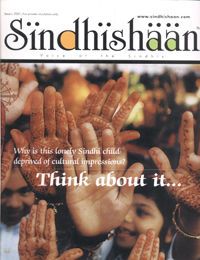THE LAST TRAIN FROM PAKISTAN
A short story by Thakur Chawla
During the days of partition, few Sindhi Hindus didn’t embark on the difficult voyage of transcending boundaries. They stayed back for the love of their motherland while a few others stayed behind because of circumstances.
“I still remember the sense in my hometown. Our village in Sindh was teeming with red chilly plantations and when the sun shone brightly above, the fields use to glow in crimson red. It was a sight beyond comparison. We were among the most prominent of chilly cultivators in the entire region. It was an age-old trade in our family going on from generations. Our godowns used to be crammed with chilly stocks that used to be transported on bullock carts across the towns to our customers.” These were the first responses by our host on being asked about his days in Sindh. Our host was an old man, 69 years of age, the proprietor of the bungalow where we resided for a few days in Lucknow.
He recalls those days of horror when, with the dawn of Indian Independence arose the dusk of Sindhi Hindus’ stay in their homeland. The arrival of the ‘Mujahirs’ into our village, imposed on us the decision to leave or else? It spelt our doom, he reflected with moist eyes. Composing himself, he narrated, “We decided to migrate to India. There was a special train to migrate all Hindu evacuees from Sindh to the Indian border. This service was introduced for only a period of 15 days.”
“We dissolved our business and sold off our assets at throw away prices. We took with us the very essential stuff, and offered the remaining to our Sindhi-Muslim co-workers with whom we shared a great rapport. Fourteen of the fifteen days went by in real quick time. Almost all the Hindus from my village had boarded the trains during the past fortnight. The time had come. We had to untie ourselves from our roots.”
“It was D-day, the dreadful day of the final train. The last train from Pakistan was to leave shores in some time. All my brothers, sister-in-laws, my sisters, my wife and children were boarded on the last train, their eyes on the looking out in despair, waiting for me to come . . . . .” Portraying an unpretentious expression, he remembers, “The train blew its final siren, the guard lifted the green flag setting the train slowly into motion leaving behind memorable memories, gradually moving away and away . . . . . . My eldest brother said, “He must have definitely got into some other compartment and we’ll catch him in the next station.” Despite assuring them of being on the train after a short meet with my friends, I never boarded the train.”
Nodding his head and looking down on the floor, he continues, “Though many stayed back because of their extreme love and affection for the motherland, I didn’t board the last train for my land and my lady love.”
“In my Hamlet was a girl named Allahdini. As children we played together and grew up to be good friends in school and college. She was my childhood sweetheart”, he said with a smile. “But to our agony we could never tie the marital knot. My brothers got me married elsewhere and Allahdini was also wedded to a Sindhi-Muslim, an employee of ours.”
He continues, “We used to meet regularly and were the moral and emotional support for each other. Partition was the last thing we could ever dream of! We didn’t want to part away, we just wanted to be each other every moment . . . . . . see each other all the time.”
“When Allahdini saw all the Hindus migrating, she panicked and cried. She was filled with sorrow, her eyes swollen and deep, she just wouldn’t stop wailing. She bore her smile back, only on learning that I had decided to stay back in the village for her. Despite my family members settling in Lucknow, I surrendered my heart and soul to Allahdini.”
“My life had taken a complete turn. I started working for the very same man to whom we sold off our business. I was blessed with Allahdini’s cooking each day. Her husband, now my co-worker, very generously offered me to have my daily repast with them. It is quiet possible he did that on the behest of Allahdini.”
I lived in Sindh for nearly thirty years after the partition. And now for the past twenty years I am residing here, in Lucknow, with my wife, my brothers, children and grand children.
He reveals, “Allahdini never gave birth. She suffered from acute asthma and despite proper diagnosis and medication her health never improved. Finally, after all the sufferings, she breathed her last in her husband’s arms. I was present there when she was dying, departing . . . . took heavenly abode. I could no longer stay there, in that place where we shared those memorable moments of our lives.”
His soggy eyes said it all, it portrayed the pain, the love, the affection, the tenderness for his beloved, as he stepped off his seat and walked away.


